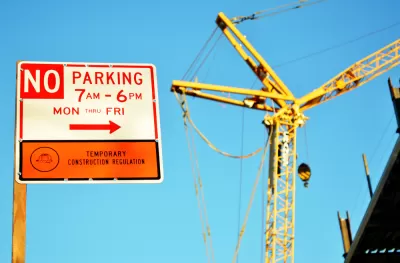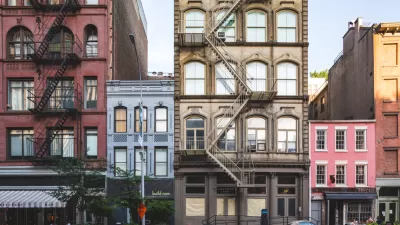The Regional Plan Association published “Parking Policy Is Housing Policy: How Reducing Parking Requirements Stimulates Affordable Housing Production.”

The Regional Plan Association (RPA) this week released a new report on the benefits of parking reform for housing production and housing choice.
According to the report, waiving parking requirements has yielded more new affordable homes, especially on smaller parcels of land. The report takes the “City of Yes” initiative announced by Mayor Eric Adams in June 2022, which includes the “Zoning for Housing Opportunity” program, as its inspiration, pushing for more attention to parking reforms.
Analyzing the limited examples of reduced parking requirements in zoning around New York City implemented under the previous mayoral administration, RPA “found that where parking minimums have been abolished, it has not only encouraged overall new housing production, but yielded a greater number of affordable units annually compared to geographies where parking minimums remained in place.”
“In other words, amending zoning codes toward the citywide abolition of minimum parking requirements can enable more robust housing production, both affordable and overall,” according to the report.
The big recommendation in the report: the Adams administration should deploy parking reform as an affordable housing tool. The previous de Blasio administration’s parking reforms were achieved by the “Housing New York” plan, launched in 2014, and the “Zoning for Quality and Affordability” plan, adopted in 2016.
FULL STORY: Parking Policy Is Housing Policy

Maui's Vacation Rental Debate Turns Ugly
Verbal attacks, misinformation campaigns and fistfights plague a high-stakes debate to convert thousands of vacation rentals into long-term housing.

Planetizen Federal Action Tracker
A weekly monitor of how Trump’s orders and actions are impacting planners and planning in America.

In Urban Planning, AI Prompting Could be the New Design Thinking
Creativity has long been key to great urban design. What if we see AI as our new creative partner?

Florida Seniors Face Rising Homelessness Risk
High housing costs are pushing more seniors, many of them on a fixed income, into homelessness.

Massachusetts Budget Helps Close MBTA Budget Gap
The budget signed by Gov. Maura Healey includes $470 million in MBTA funding for the next fiscal year.

Milwaukee Launches Vision Zero Plan
Seven years after the city signed its Complete Streets Policy, the city is doubling down on its efforts to eliminate traffic deaths.
Urban Design for Planners 1: Software Tools
This six-course series explores essential urban design concepts using open source software and equips planners with the tools they need to participate fully in the urban design process.
Planning for Universal Design
Learn the tools for implementing Universal Design in planning regulations.
Gallatin County Department of Planning & Community Development
Heyer Gruel & Associates PA
JM Goldson LLC
City of Camden Redevelopment Agency
City of Astoria
Transportation Research & Education Center (TREC) at Portland State University
Jefferson Parish Government
Camden Redevelopment Agency
City of Claremont





























